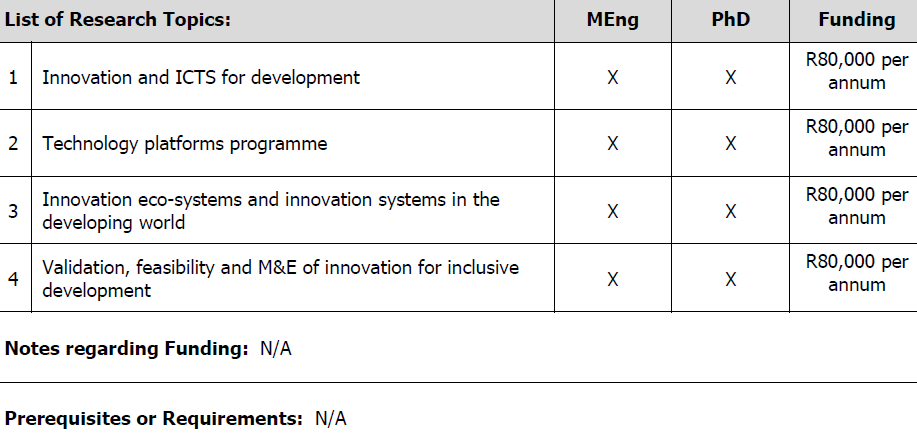
Field of Research:
Innovation for Inclusive Develoment (I4ID)
Lecturer: Prof Sara Grobbelaar
Theme 1 – Innovation and ICTS for development:
In this theme we have a number of projects available to contribute to cutting edge thinking on how industries of the future will function with a main aim of driving inclusive development. This includes technology development, analytics and exploratory projects on how industries will be affected, change and adapt to disruptive technologies. We explore what changes and development will hold for the farmer of the future, healthcare for the future, retail of the future and developments in fintech and legaltech.
Theme 2 – Technology platforms programme:
There exist a wide range of types of innovation platforms, these may include living labs, business incubators, open innovation platforms, rapid prototyping platforms, agricultural or health innovation platforms and university-driven research or innovation platforms. Through this programme we explore the functioning and setup of such infrastructures and how these contribute to how innovation and technology can be developed to improve the delivery and access to goods and services across the sub-Saharan African continent.
Theme 3 – Innovation eco-systems and innovation systems in the developing world:
In this theme we grapple with the questions of how we can strengthen the capacity of the innovation system to effectively develop, adopt and diffuse new technologies towards providing inclusive growth and development. Here the focus is on developing improved analytical frameworks to analyse and develop strategies for pro-poor value chains and inclusive innovation system;
Theme 4 – Validation, feasibility and M&E of innovation for inclusive development:
This part of the programme grapples with the development of quantitative and qualitative decision support tools, models and frameworks. With the roll-out of large scale innovation programmes (e.g. a recent roll-out of an m-Health initiative by a large telecoms company to 15000 clinics), effective monitoring and evaluation needs to be done to ensure successful implementation but also to prove business cases in future. This is especially important if companies want to penetrate a public sector vertical or secure funding as real business cases need to be based on hard data; There are also many hidden costs and implementation frameworks need to take these issues into consideration. This will also aim to help companies set up their intervention programmes to ensure that they will be able to evaluate and monitor successes and failures. Possible verticals for studies here include public health systems/mobile technology in agriculture/education etc.
We have scholarships available for 4-5 students who want to work within the abovementioned themes. Possible internships at partner organisations exist as well as performance incentives. We welcome students from other engineering disciplines as innovation projects may also (if the student wish) to include the development of technological innovations – especially for Theme 1 and Theme 2.

Researchers Group Members





